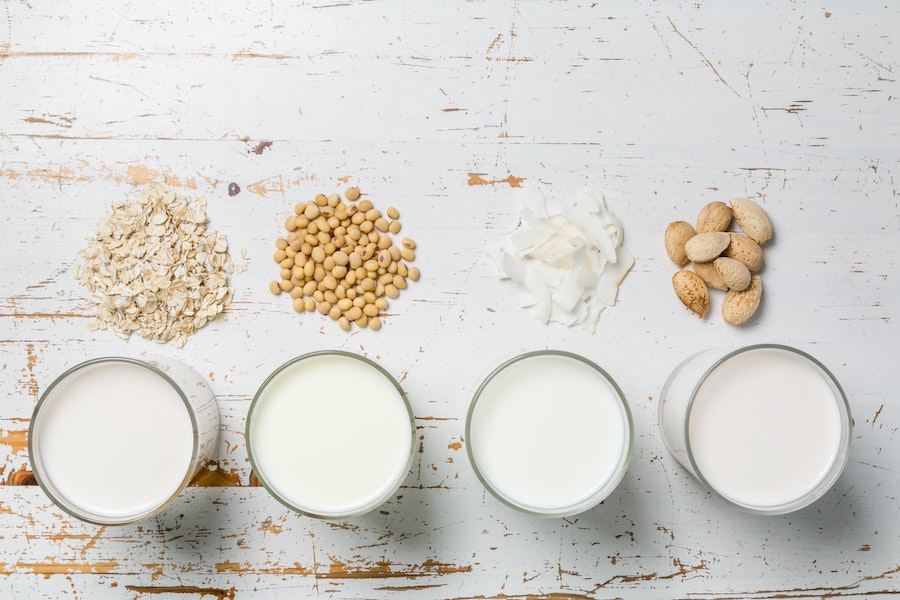Soya, oat or almond? 4 of the most popular milk alternatives explained
Not that long ago, regular cow’s milk was pretty much the only choice available. Now, supermarkets offer a variety of dairy-free milk alternatives, and you’ll often find the same at coffee shops and cafes, thanks to the rise of plant-based eating and better awareness of food intolerance and allergies.
If you’re new to the dairy-free world though, and are curious about giving an alternative option a try, finding the right milk substitute can be confusing. Different ‘milks’ can offer different nutritional benefits, and each come with a unique taste and consistency that might be unusual at first.
Here, we’ve broken down some of the main dairy-free ‘milk’ contenders you should know about…
1. Oat milk
As well being dairy-free, oat milk is unique in that it’s also nut-free and often gluten-free too. It’s made from blending steel-cut oats and water, and then straining the thick mixture to make a creamy and smooth liquid. Baristas say it’s particularly great in coffee, as it can be whipped into lattes and doesn’t curdle easily when heated.
Oats are super-absorbent, which means the strained milk retains many of the grain’s important nutrients, like protein, fibre and iron. Oats also contain beta-glucans; natural sugars that are thought to help improve cholesterol, heart health and blood sugar levels. It has a relatively low fat content too, with around 0.2g of saturated fat per 100ml.
Try it: Oatly Oat Drink, £1.39 for 1L, Asda
2. Almond milk
You’d have to have been living under a rock to have missed the hype around almond milk. The trendy dairy-free alternative has a rich texture similar to traditional cow’s milk, making it a hit with vegans and people who are lactose-intolerant.
Regular almond milk is not as nutritious as cow’s milk, but fortified varieties often contain added vitamin D, calcium and protein. Look for varieties that don’t contain added sugar too. As it has a sweet and nutty flavour, it’s a delicious breakfast staple and a good accompaniment to cereals and overnight oat recipes.
Try it: Rude Health Almond Drink, £1.50 for 1L, Sainsburys
3. Soya milk
Soya milk is the original dairy-free alternative that’s kind of fallen out of fashion as other varieties have arrived on the scene. It still has some pretty impressive benefits worth taking note of, though.
First up, it’s a good source of protein, containing around the same amount as cow’s milk. It’s also rich in vitamins A and B-12 and potassium, and you can find varieties that are fortified with calcium and vitamin D too. Soya milk is also cholesterol-free and has a low saturated fat content.
It’s made from soybeans and filtered water, and has a distinct ‘love it or hate it’ savoury flavour. Soya milk is often thicker than other plant-based milk alternatives, making it a great replacement in recipes like pancakes and muffins.
Try it: Alpro Fresh Original Soya Milk, £1.40 for 1L, Ocado
4. Coconut milk
Prepare to hear much more about coconut milk (Jamie Oliver has been raving about it on Twitter). The white, milky substance isn’t made from the liquid found when you smash open a coconut – but instead by blending the fruit’s sweet white flesh with water. It’s probably more accurate to refer to it as ‘coconut drink’, because it’s actually a far more diluted formula than the type of coconut milk used in Thai cooking, which you usually buy in tins.
One great thing about coconut milk is that it’s free from from major allergens including dairy, soya, nuts (despite the name) and gluten. Much like almond milk, it’s best to plump for fortified varieties if you’re cutting out regular milk altogether, like Koko’s new Dairy Free Super Drink, which is enriched with nine vitamins and minerals including calcium, folic acid folate, Iodine and vitamins A, B12, C, D2 and E. Like the cooking variety, coconut milk has a deliciously fresh and full-bodied taste, making it perfect as a base for smoothies, on cereal, or simply enjoyed as a straight drink.
Try it: Koko Dairy-Free Super Drink, £2 for 1L, Sainsburys
The Press Association
Latest posts by The Press Association (see all)
- 9 ways to look after your emotional health better in 2025 - January 7, 2025
- EastEnders fans to vote on storyline for the first time in 40th anniversary week - January 7, 2025
- Aldi beats rival Lidl as cheapest supermarket of 2024 - January 6, 2025
- All the benefits of lifting weights beyond bigger muscles - January 6, 2025
- The best ways to boost your immune system as cold temperatures hit - January 5, 2025




















